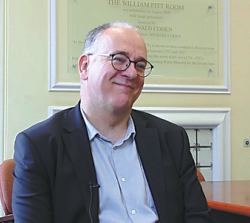China, from good student to wise teacher

Post COVID-19 collaboration

The Chinese government takes poverty reduction very seriously and has set itself the goal of eliminating all extreme poverty by the end of this year, a goal Brown said China is "well on track" to achieve despite the challenges posed by the impact of COVID-19.
China's record of responding to crises in the past few decades, particularly in dealing with the post-2008 global financial crisis, has been effective, he said.
"So there is a good likelihood that the central government and provincial ones have the right levers, policy options and resources to be able to get on top of the vast challenges of COVID-19 and then move beyond them."
The challenges China faces are probably not so much whether it can deal with its aim of lifting the final group of people out of absolute poverty, he said, but what sort of role it may take in the face of large-scale poverty elsewhere in the world. The World Bank estimates that up to 60 million people are likely to be pushed into extreme poverty as COVID-19 takes its toll on the world.
"This could be a moment for China to also play a role in addressing with other governments these issues through its own experience of poverty alleviation, but also through enhanced cooperation and greater efforts to work together."
While China is being seen as geopolitically ambitious and having large strategic aims, Brown said few really understand that it can play a huge role in practically addressing developmental issues in the developing world.
"That is truly win-win because it assists in creating a much more understandable image for China, (and) also aids countries that are really likely to struggle with the tough economic conditions we seem to be heading quickly into."
Milestone marked
Brown hails China's aim to be a moderately prosperous society by the end of this year as a milestone, because for the first time the world will see modernity with Chinese characteristics-the emergence of a middle-class in a country with most people working in the services sector.
"This is an important milestone because it means the world really will be dealing with a China unlike any they have dealt with before in modern history-a place where in terms of prosperity levels it will no longer be a developing or undeveloped country, but a place where many areas will be as advanced, or even more advanced, than in Europe or America."
The main issue the country will now face is how to restructure the economy through urbanization and how to improve the services sector to create good jobs for young Chinese entering the labor market each year, and to address the inequalities and imbalances within the country.
"Poverty is often relative. Today's relatively well-off people may be tomorrow's less well-off, with nothing changing for themselves, but the world around is transforming, so the constant process of ensuring that people feel their lives are going in a positive direction, and that tomorrow will be better than today, is crucial. This is not so much about poverty eradication, but about eradicating the feeling of relative poverty."
Kerry Brown is one of the leading Sinologists in the United Kingdom, specializing in Chinese history and politics.
He is the author of more than 10 books on modern Chinese politics, history and language, including: The New Emperors: Power and the Princelings in China (2014); What's Wrong with Diplomacy: The Case of the UK and China (2015); Berkshire Dictionary of Chinese Biography (in four volumes, 2014-15); China's CEO: Xi Jinping (2016); China's World: What Does China Want? (2017).
Brown, a professor of Chinese studies, currently directs the Lau China Institute at King's College London. He believes that China's changes and growth over the past 25 years have contributed substantially to the improvement of living standards worldwide.




































